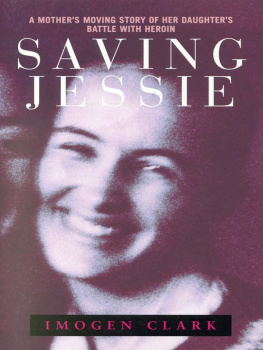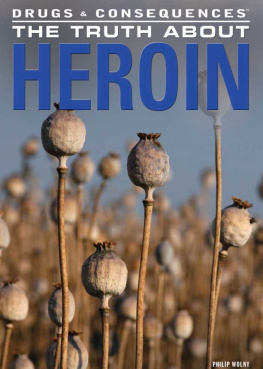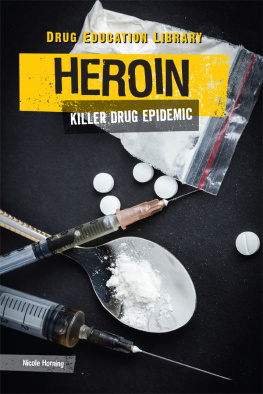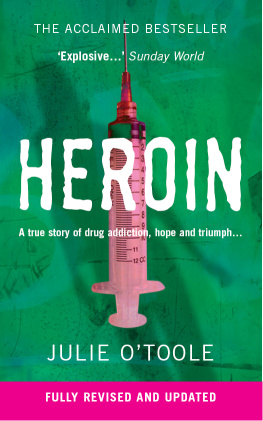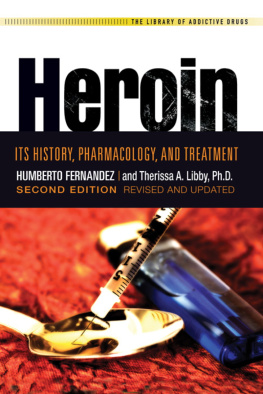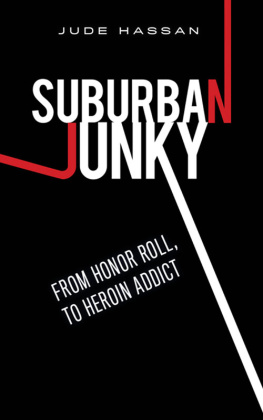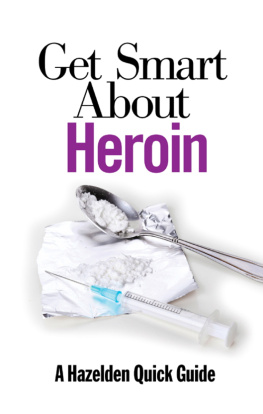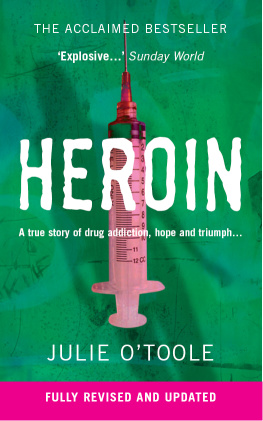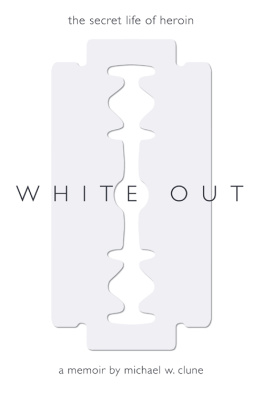
CONTENTS
About the Book
Nothing could prepare Imogen Clark for the shock of discovering that her daughter was a heroin addict. The youngest child in a tightly knit, loving family, Jessie was intelligent, beautiful and talented she did not fit the stereotype of the unhappy child who turns to drugs to escape pain.
This astonishingly candid, deeply moving and inspiring account of a mothers battle to find the strength to deal with her daughters heroin addiction confronts the reality of every parents nightmare. It is the story of an ordinary family whose lives were changed forever by heroin addiction. It will offer comfort and hope to others facing the same battle and reassure them that they are not alone.
Jessie and her family have won the battlefor now. But it is a story without an end: We will struggle day by day for a very long time before it might become part of our family history and someone will be able to mention almost in passing, Do you remember when Jessie was using?

For Joe, who lived through it too
For Lucy and Sam, for their constant love and support
For my dear friends, who never failed to ask how she was
But most of all for Jessie,
for her trust and courage in allowing me to write about her life
PROLOGUE
This is the story of an ordinary family and in particular of our daughter Jessie.
When I first learnt that Jessie was using heroin I tried to find something to read about heroin use from a parents perspective. I was expecting to find a title like What To Do When Your Child Is On Heroin somewhere on the self-help shelf, something that at least could give me some reassurance that the way I felt and was reacting was similar to other parents. There were books about hyperactive children, how to deal with arthritis and what do in all sorts of different relationships. But nothing on what, to me, was an overwhelming and terrible problem. There were pamphlets to explain effects, withdrawal, harm minimisation and so on, but nothing at all that could assist me and my husband and Jessies sister and brother to survive what initially seemed to be a daily, unfolding nightmare. Support groups for parents of addicts held no appeal to begin with. It was far too soon for that.
This is not a survival handbook. None could be written. But it is a chronicle of how it was for me and the rest of our family. Whilst every familys story is different, I imagine there will be common elements that many families may identify with.
It is a story with hope but without an end. We will struggle day by day for a very long time, before it might become part of our family history and someone will be able to mention almost in passing, Do you remember when Jessie was using? And we will all nod quietly.
I hope this book brings comfort to other familiesto parents especiallyto know you are not alone.
Pseudonyms have been used and other details altered
where necessary to protect the identity of people and
organisations mentioned in this book.
CHAPTER 1
What is it that leads some people to drugs? The literature is filled with a complex interaction of many factors, ranging over social, psychological, and familial. Where to put the emphasis for Jessie? Was it a form of protest, a result of boredom, disillusionment with the establishment, the hopelessness of her generation and pervasive youth unemployment? Was it due to her personality, her inability to cope with normal problems as they occurred? Did we protect her too much from pressures and the consequences of her own actions? Was she programmed with an addictive personality and addiction to something almost inevitable? Was she particularly susceptible to peer pressure? Prepared to take risks recklessly? Was the structure and nurturing environment of our family somehow inadequate?
We were, and still are, a very ordinary, middle-class family of five. Joe, my husband, works as an academic at a university five minutes from where we live, and I work as a primary-school teacher. We met and married while still at university, conceiving our first child, Lucy, within weeks of the wedding. My mother, while being thrilled at the prospect of becoming a grandparent, was also concerned that our wedding date might be confused with that of Joes brother, who had married some months after us. She had sent out all her Christmas cards with the message, Imogen and Joe were married in May and are expecting their first child at the end of April, just so everyone could refer back to it. It was a common concern of her generation and she certainly did not want our marriage to be thought of as shotgun.
I cared for Lucy while Joe taught, eventually working part time to supplement the meagre wage then paid to junior teachers. After a couple of years, we moved from Launceston to Adelaide, where we lived in Elizabeth for a year and Sam was born. Twelve days later we moved to Darwin for a further two years, before finally settling in Canberra. Jessie was our third child, born to much jubilation when Lucy was seven and Sam four.
We had agonised over having her. We were committed to zero population growth, to replacing only ourselves, until my maternal urge bowled me over again, quite unexpectedly. I hadnt reckoned on the cuteness factor of a friends baby. We were visiting friends, on our first weekend away without our children. I can still visualise baby Timothy, crawling naked in the sunshine, radiating health and contentment, his parents besotted. What a shame that we were not having another child, who we could cherish through infancy. Joe was a bit appalled as I put it to him. After all, we had two beautiful, healthy children, even a boy and a girl. But after six months of throwing the idea around we had agreed. Within days I was pregnant and we were both thrilled.
Baby Jess occupied a very favoured position in our family not only was she wanted by us, but her sister and brother regarded her as their baby too. I remember how much they both wanted to be the first to give her a cuddle when I brought her home from hospital. Joe had settled me on the couch, as they both burst in from school and preschool. How could we resolve this? Age, perhaps? Then Joe had a stroke of genius. Whoever had the first cuddle could have a short one and whoever had to wait till second got a longer one. They were both happy. And for most of their growing up it never changed. They just loved her. They would fight with each other, but rarely with her.
We had great difficulty in choosing a name for her. Finally, Joe pointed out that I really had my way with both the other two, so it was my turn to choose from his list. We agreed on Jessica, but within days Joe started referring to her as messy Jessie. And Jessie she became. It seemed to suit her. Much later, we realised that the character in the TV program When the Boat Comes In had influenced us greatly. Joe liked strong-minded people and Jessie in the TV show was certainly that. Perhaps our Jessie absorbed it through the womb!
As I reflect on Jesss life, I realise she showed strong indications of individuality at an early age. And whilst she was in no way a difficult child to raise, there were signs while she was still only young, that life with her was not going to be boring.
As a baby she was not a good sleeper. Actually, she was dreadful. Several times each night I would get up to settle her, often walking the floor in an attempt to stop her disturbing the rest of the family. But in the mornings, I would look at her little chubby arms being held up for a cuddle and her beaming little face, and all frustration at the endless nights before would vanish. We were lucky just to have her.

